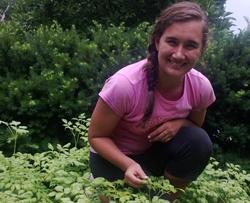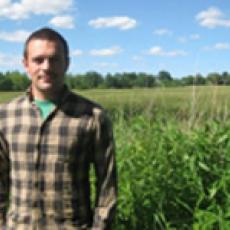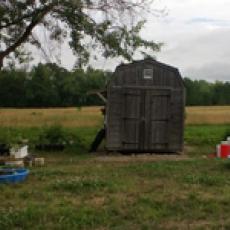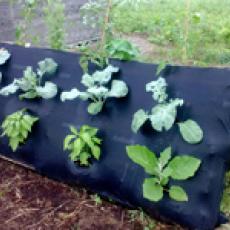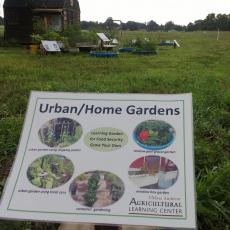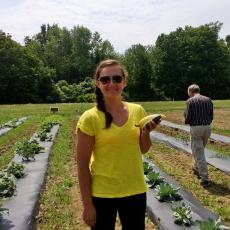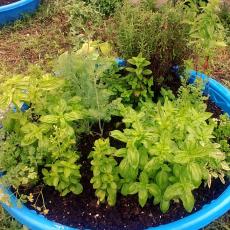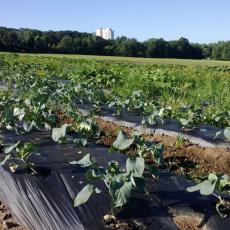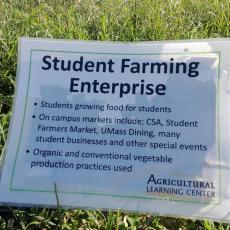With memories of the April groundbreaking ceremony still in mind, the stakes are (literally) in the ground as farm work gets underway at the new Agricultural Learning Center (ALC) at the north edge of the Amherst campus. The purpose of the ALC is to train the next generation of farmers and other agricultural entrepreneurs by using a hands-on approach: translating classroom knowledge into practical experience in the fields. UMass faculty, are working along side undergrads pursuing summer internships, are the first in fifty years to put their hands in this particular dirt.
UMass students are planting, managing and harvesting crops under the guidance of sustainable farming educator Amanda Brown, both from the Stockbridge School of Agriculture at the University. Zachary Zenk, Assistant to the Farm Superintendent for the Center for Agriculture, is also a key participant in this project. The first crops being planted at the ALC include: corn, soybeans, gourds (pumpkins and calabaza), kenaf, edamame and a few brassica crops including collards and kale. Sunflowers will represent oilseed crops and cutting flowers are scheduled to be planted this summer.
Across the river at the UMass farm in South Deerfield, students are investing true ‘sweat equity’ for the Student Farming Enterprise (SFE) this summer. Cole Lanier, one of those students, is also assigned to the ALC in Amherst two days a week. He said, “A lot of my peers are interested in having occupations that are congruent with our social and environmental values. This opportunity is something that Stockbridge School of Agriculture is interested in making available for young people who are passionate about sustainability and the environment.”
Lanier supports the idea that the ALC be made welcoming for non-agricultural majors as well as ag majors. Another platform for this is the “Garden Share” program, in which student leaders, all Sustainable Food and Farming (SFF) majors, are working at a garden this summer and will provide leadership for other students to do so next semester. Next semester’s participants in the class will for the most part not be SFF majors but they can enroll in the Stockbridge “Garden Share Practicum” class in the fall and spring semesters. Lanier believes that a similar or expanded effort could take place at the Agricultural Learning Center.
Student intern Cassie Sefton has planted the new Urban Garden area at the ALC as well as rows of vegetables for home gardens on an adjacent plot. These two demonstration sites are intended to educate visitors who want to grow food in challenging urban areas. Interpretive signage that includes “how to” instructions will assist those who want to replicate models that include commonly found items such as pallets, containers and kiddie pools as vessels for growing food. Cassie said, “at the Urban Garden we are showcasing different types of gardens for people who may not have good soil or enough space. Anyone can grow their own food and for me, putting work into this project makes me appreciate it that much more.”
Stephen Herbert, Director of the University’s Center for Agriculture, remarked recently that, “the purpose of the ALC is to learn by doing, as UMass founder and early president Levi Stockbridge frequently reminded his students.” Herbert plans to incorporate much-needed education around urban gardening options at the ALC. He points out that there are many creative cost-effective strategies for growing food in areas now being dubbed as “food deserts.” Access to fresh foods can be very difficult in neighborhoods where blacktop, convenience stores and fast food outlets are the norm. To help alleviate this situation and to decrease the risk of human health issues that go hand-in-hand with lack of fresh foods (obesity, diabetes, heart conditions, etc.), Dr. Herbert has devised several easy-to-use methods for urban dwellers to grow their own food with the added benefit of offering more reliable food security. These include the use of children’s backyard swimming pools filled with gravel and a nutrient solution for plants, window boxes, container gardens and shipping pallets, among other commonly found inner city materials. A demonstration of techniques for urban gardens is currently showcased at the ALC together with traditional home gardening. When harvest time approaches this fall, plans are for student farmers to be working with other interested groups on campus including the “Botany for Gardeners” class and sustainable agriculture classes to harvest the crops that result.
Off campus internships
All two-year Sustainable Food and Farming students and some four-year Sustainable Food and Farming majors are working on internships at farms this summer. The farms include Mockingbird Farm in Easthampton, Many Hands Farm in Amherst, Alprilla Farm in Essex, Full Bloom Farm in Whately and Klein's Kill Fruit Farm in Germantown, New York.
August 7, 2103 Field Notes
Flowers are planted- sun flower, calendula, and amaranth. Pumpkins and gourds are coming in and more fall broccoli just went in the ground. Rye, oats and buckwheat went in as cover crops in the unused land and will be ready to display to students this fall semester. We are harvesting Magda squash - more commonly called cousa which is similar to a cross between yellow summer squash and zucchini - for the NOFA MA local foods dinner this week which is exciting as well.
